We have dived in to another year of working hard and being useful throughout the nation. We’ve got six disaster recovery and two preparedness workshops coming up in February, amicus briefs, reports and new buyers’ guides in production. Our newWhat’s UP with Renter’s Insurance is now available in English and Spanish.
We have big plans for 2014 including proposing a Catastrophe Claim Handling model law suitable for adoption in all 50 states.
Last year UP served over 140,000 consumers through our website;
In case you missed our last print newsletter, we’re e-sharing highlights below.
We can never thank our donors, volunteers and supporters too many times…THANK YOU!!!!

Thanks to the Internet, FedEx, Priority Mail and UPS – more and more people are avoiding the drag of commuting by working from home. If you’re one of the estimated 43 million Americans in this mode – you’ll want the right insurance in place. You need insurance on the equipment you use primarily for work, and you need liability protection.
Did you know that your renters or home policy probably has a limit of as little as $2,500 for stolen or damaged home business equipment? Did you know it may not protect you if someone is injured visiting you for a work meeting, delivering a work package, or if someone sues you for work you did for them from your home?
Depending on whether you’re working from home occasionally or running a full scale home-based business, you can buy an endorsement to your current policy, or a free-standing home business policy.
As with all insurance products in today’s marketplace, you need to shop for the coverage that will actually protect you. Don’t just go for the cheapest policy you find. Inventory your business property, plan out questions in advance, then be ready to take notes when you confer with at least two high quality brokers or agents to find the best option for your specific home business needs.
DISCOUNT ALERT: UP Executive Director Amy Bach is one of many experts presenting at the ACI Insurance Regulation Conference in NYC on February 27th, 2014. Register today for a discount on your tuition.


CO Governor Hickenlooper signing the Home Insurance Reform Act of 2013 surrounded by wildfire survivors, UP staff and elected officials.
What do all Americans have in common? S#!t Happens. At some point, to everybody. People get sick, people get hurt. People make big mistakes, people’s homes burn, flood and get blown away. Small businesses get broken into, large businesses get sued for mega bucks.
Yes, S#!t Happens – and when it does, people need money. Therein lies the beauty of insurance. It’s designed for the risks we all face. What is insurance? A big pot of money that’s guarded and grows. A pool. When we buy insurance, we join the pool and contribute to the pot. We want that pot to stay full so money is available if S#!t Happens to us. Our contributions, combined with other people’s contributions – make that possible.
Insurance pools work best when the people in them have differing characteristics.Old/young, big/small business, urban/rural drivers, homes near rivers/homes in the desert. In insurance lingo – it’s known as “risk profiles.” The pooling of diverse risks is what makes insurance work. Here at UP, we see the beauty of insurance systems and we want them to work.
But as we travel to disaster areas around the country, we also see the beast. Werepeatedly see hard-hit home and business owners struggling with unexpected gaps in their property insurance and frustrating fine print exclusions. Journalist Lisa Gibbs’explored this phenomenon in “Covered by homeowners insurance? Don’t be so sure” (April, 2013, CNN/Money). And State Farm agent Dean Jarvis talked about it in “Protecting the House,” an important article that ran in the June 2013 issue of Claims Management magazine.
Property insurance gaps are also putting a heavy burden on government aid programs, charities and public insurance entities like the National Flood Insurance Program and the Texas Windstorm Association. We invite you to read the comments on disaster insurance that UP recently filed with the Federal Insurance Office, ID: TREAS-DO-2013-0001-0001.
S#!t happens to everyone. We’re all in this together, lets hear your good ideas.
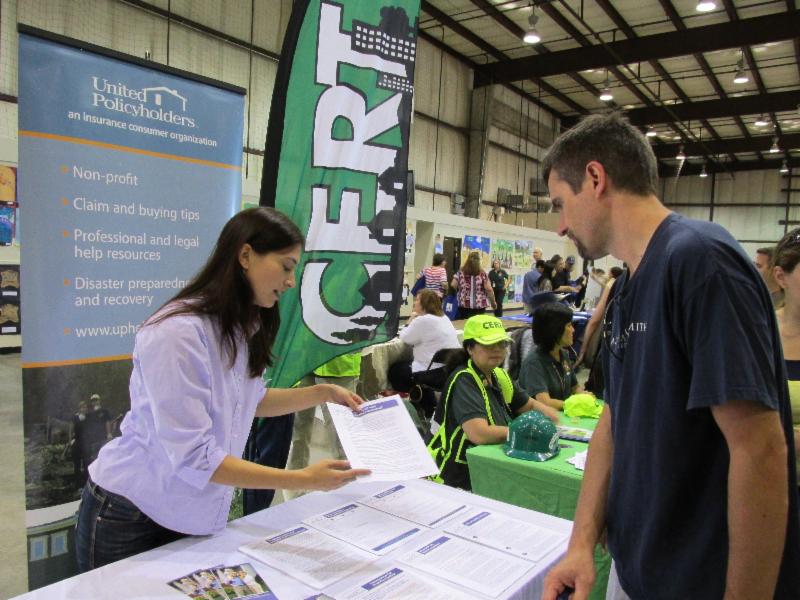

Emily Cabral pictured at a Bay Area Preparedness Event.
UP’s #1 preparedness tip: Insurance money – not charitable or government aid – makes the biggest difference in people’s ability to rebuild and recover after a disaster. FEMA agrees.
Out of thousands of applicants UP’s Roadmap to Preparedness program was one of only 30 selected to receive a FEMA 2012 Community Resilience Innovation Challengegrant. FEMA recognizes the value of our messages and tools for preparing for adversity by creating an adequate insurance safety net. Because UP doesn’t sell insurance and because many of our messengers speak from personal experience about steps they wish they’d taken before their disaster, our preparedness work is unique and extra valuable.
Please contact us if you would like a speaker for an event aimed at promoting and facilitating disaster preparedness.
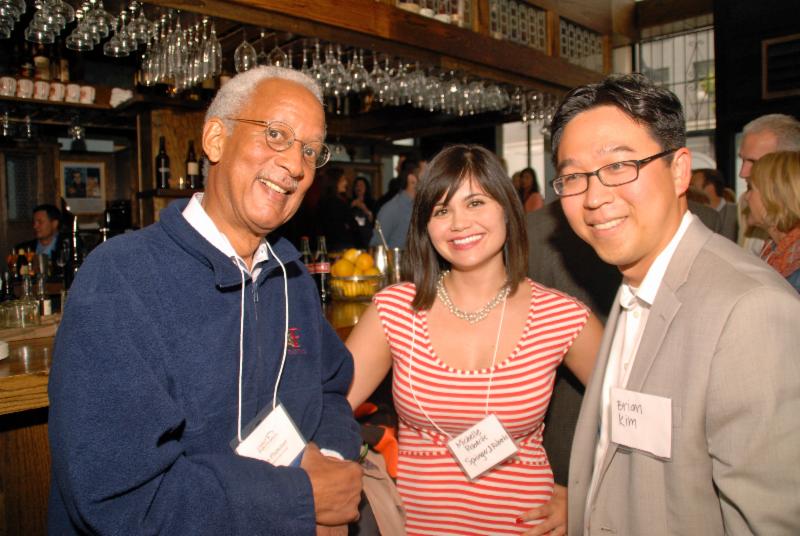

Amicus Project volunteers Jim Plummer, Michelle Roberts, and Brian Kim.
United Policyholders’ Amicus Project volunteers continue to do outstanding work for insurance consumers big and small in courts throughout the United States.
In 2013 we appeared several times in the nation’s highest court and numerous times in state and federal appellate courts. We weighed in for a South Carolina man hit by an underinsured motorist, a paraplegic former marine in California, a couple who bought a piece of land in Hawaii, a manufacturing company in Utah and law-abiding drivers in Montana.
We’re talkin’ proud. We’re talking thrifty consumer advocacy. Our briefs are written by lawyers who are recognized experts in their field and virtually all donate their services to UP pro bono. Visit our Amicus Project Library for a complete list of our volunteer superstars and click here to read more.
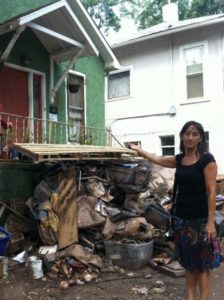

Kerri Olivier showing heartbreaking flood damage to a young couple’s home in Manitou Springs, CO.
When you paid extra for “replacement cost” (RC) property insurance, as most people do, it probably didn’t occur to you that you could forfeit that benefit if you weren’t able to replace all your stuff within 6 months after a loss. Yet a 180 day deadline for collecting RC benefits is one of the many hidden catches in home policies today. Six months may seem like enough time, but trust us –
it isn’t.
There are many reasons people need time to replace what they lose in a catastrophe. Construction delays are common, and during the repair phase, most people move into smaller temporary housing units with very limited storage. Some insurers will pay full benefits after this deadline passes, others won’t. In United Policyholders’ view, that’s a deadline that should always be extended for good cause. Needless to say -insurers profit when consumers miss that deadline and forfeit their full benefits. We believe that if you’ve paid for replacement value coverage, you should be entitled to collect every dollar of that benefit, as long as you’re doing your best to progress through recovery. We’re calling for a 180 on the 180 clause. Click here to read more.
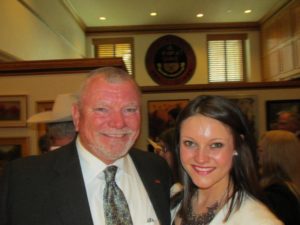

Thank you Steve and Lauren Price!
Since becoming active in Colorado after the 2010 Fourmile Canyon wildfire in Boulder, UP has delivered services to thousands of people and built a solid foundation for future work. We couldn’t have done it without our generous funders; our Boulder, Larimer and El Paso County partners; and our very dedicated volunteer corps. Our corps includes: 2012 Fort Collins wildfire survivor Dale Snyder, 2012 Colorado Springs wildfire survivors Kerri Olivier, Steve, Karla and Lauren Price, Masami Hua, Donald Meaney, Jan Johnson, 2007 San Diego Fire Survivor, Robyn Walery, 2010 Boulder wildfire survivor Bruce Honeyman and Andi O’Conor, plus volunteers Garry Sanfacon, Scott DeLuise, Tom Henderson, Bruce Kabat and pro bono lobbyists Terry Snyder and Mercedes Aponte.
Lauren Price was a college student when her family home burned in the June 2012 Waldo Canyon Fire in Colorado Springs. Price stepped up this summer to offer comfort to the 2013 fire victims at a Recovery Center. Lauren also helped out at United Policyholders volunteer appreciation luncheon in Denver before the signing of the Home Insurance Reform Act of 2013. Thank you Lauren, thank you Price Family!
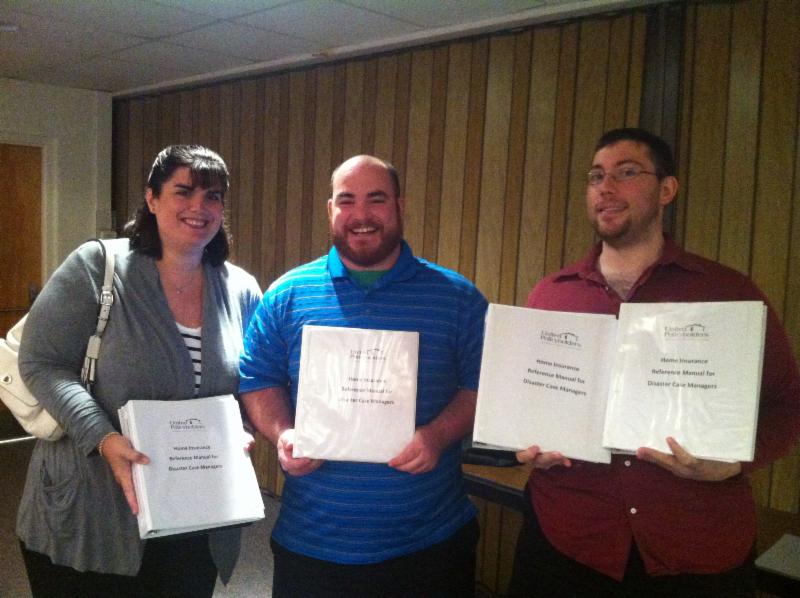

American Red Cross case managers receive their UP training manuals.
Since Sandy hit last October, UP has been answering consumer questions, distributingrecovery kits, hosting workshops and helping residents with insurance problems in coordination long term recovery partners in the area.
Over 9,400 New Jersey residents have used our online Superstorm Sandy Claim Help library and we are receiving a steady stream of help requests via our “Ask an Expert” online forum. Common questions relate to the NFIP’s “sworn” proof of loss rules, coverage for foundation damage (“scouring”) and public adjuster fees and contracts.
We thank our New Jersey advisors including Mantoloking CFP Peter Wright, attorneys Roman Rabinovich and Harry Cummins, (Wilkofsky, Friedman, Karel and Cummins), Chip Merlin, (Merlin Law Group), Les Knox and Chris Aldrich (Andrew K. Knox & Co.)Michael Miller (Miller & Sons), and many others including Peter Hartt (Director, New Jersey Division of Insurance).
